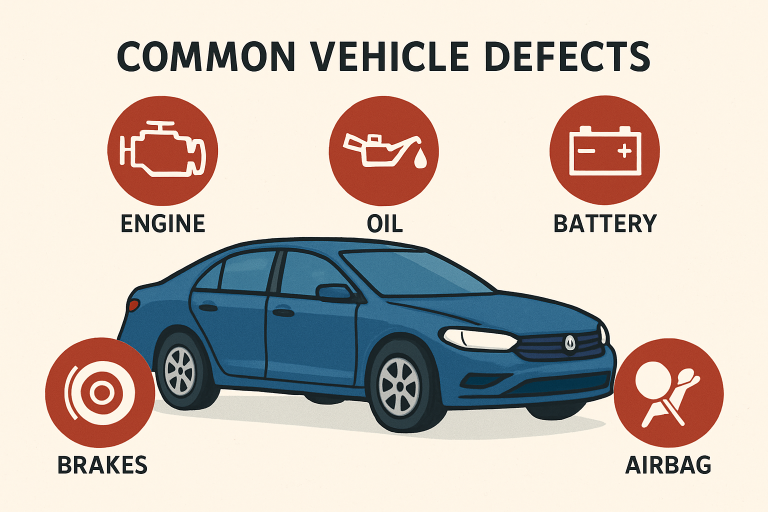Table of Contents
- Engine Problems
- Transmission Issues
- Electrical System Failures
- Brake System Defects
- Steering and Suspension Failures
- Airbag and Seatbelt Malfunctions
- Infotainment and Navigation System Failures
- Water Leaks and Mold
Persistent vehicle problems can quickly turn a new car experience into a frustrating ordeal. When defects repeatedly affect the safety, use, or value of a vehicle—and repairs fail to fix them—owners may start to question their legal options. Understanding how lemon laws work is essential, especially when a manufacturer or dealer can’t deliver a fully working product after several attempts.
Consumers dealing with ongoing car troubles often seek legal guidance to explore their eligibility under state lemon laws. Working with a lemon law attorney Sacramento can help clarify whether a vehicle qualifies and what remedies, such as a refund, replacement, or compensation, may be available. Legal insight ensures the issue is appropriately documented and addressed through the correct channels, helping protect consumer rights.
Engine Problems
Engine defects are among the top reasons car owners pursue Lemon Law claims. When a car’s engine repeatedly stalls, misfires, consumes excessive oil, or displays warning lights that signal imminent failure, it undermines driving confidence and daily usability. If repair shops cannot resolve these recurring issues after several attempts, owners may have a strong Lemon Law case. While some issues are minor, problems such as knocking noises, loss of power, or frequent overheating merit immediate attention due to potential dangers and repair costs.
Transmission Issues
Transmission defects make vehicles unreliable and lead to dangerous situations on the road. Common complaints include slipping gears, rugged or delayed shifting, jerking sensations when accelerating, and inability to engage drive or reverse gears. Total transmission failure often necessitates expensive replacements. If these issues persist even after multiple authorized repair attempts, owners should begin documenting every service record, which could be crucial evidence in a Lemon Law claim.
Electrical System Failures
Modern vehicles integrate increasingly complex electrical components that manage critical and convenience functions. Electrical system glitches can range from minor annoyances, like malfunctioning interior lights or dashboard displays, to major setbacks, like unintentionally deployed airbags, engine cut-outs, or failed power steering. Erratic warning lights, dead batteries, or malfunctioning sensors can all create significant safety concerns, making prompt, qualified assessment and repair vital. Recurring electrical faults are a frequent basis for legal claims under state Lemon Laws.
Brake System Defects
Few defects are as concerning as those affecting the braking system. Problems here—premature brake pad wear, unresponsive pedals, vibrating or pulsating brakes, or failures in the anti-lock braking system (ABS)—compromise the essential ability to slow down or stop safely. Such problems are stressful and put all road users at risk. If your car’s brake issues persist, despite ample opportunities for repair, you may be eligible for protection under Lemon Law statutes.

Steering and Suspension Failures
Steering and suspension issues manifest in several ways: wandering steering, uneven tire wear, excessive vibrations, leaning, or poor handling—even on smooth roads. Defects in these critical systems can reduce your control, making collisions more likely. A steering column that locks up or a suspension system that wears out prematurely often necessitates substantial repairs and legal action if repairs don’t permanently solve the issue.
Airbag and Seatbelt Malfunctions
Safety features such as airbags and seatbelts are the first lines of defense in a crash. If they fail to deploy, deploy without cause, or refuse to latch, the risk of injury during an accident increases considerably. Manufacturers and regulators treat these as critical defects due to their direct impact on occupant safety. If repeated fixes don’t restore integrity, affected consumers should consider Lemon Law action as these malfunctions can have serious consequences.
Infotainment and Navigation System Failures
Beyond primary driving functions, today’s cars depend heavily on infotainment and navigation systems for communication, entertainment, and guidance. Problems like unresponsive touchscreens, frozen displays, malfunctioning Bluetooth, or GPS systems consistently providing wrong directions can undermine convenience and overall satisfaction with a new vehicle. While not immediately dangerous, malfunctioning technology systems that remain unfixed after multiple service visits may also qualify as major defects under Lemon Law, particularly if they affect a vehicle’s resale value.
Water Leaks and Mold
Leaks around doors, windows, trunk seals, or sunroofs can let water in, causing mold, mildew, and interior damage. Signs include damp carpets, musty odors, and fogged-up windows. Persistent leaks affect comfort and can corrode electronics and structural parts. Repeated failures may make a car a Lemon Law candidate. Owners should document all leak repairs or mold issues.
Knowing common vehicle defects helps you spot warning signs early. If problems persist after repairs, consider consulting a legal professional. As vehicle technology advances, understanding potential issues and your rights helps protect your investment and safety.
READ ALSO: Law Office of Kevin Zazzera: Staten Island Bankruptcy Help











